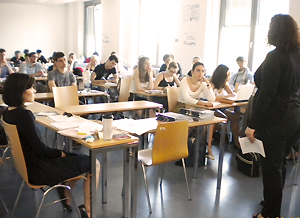
Vienna, 4 June 2011 - "The role of justice in rule of law work in United Nations Peacekeeping"- was the topic of a special lecture at the Institute for Political Science of the University Vienna on the occasion of the International Day of UN Peacekeepers (29 May).
After a cinematic introduction to the three components of rule of law - police, justice, and penal system - the former Justice and Human Rights Advisor working in UN missions in Haiti and East Timor, Virginia De Abajo Marqués, gave a practical insight into the work of UN missions to enhance the legal system in these respective countries.
Based on practical examples and personal experiences, De Abajo Marqués who is currently working as Criminal Justice and Crime Prevention Officer in the United Nations Office on Drugs and Crime in Vienna (UNODC), discussed with over 50 students the different angles of justice and rule of law work in UN peacekeeping: what can UN missions contribute to make courts more functional and trials more just and transparent? How does one take action against defects in the legal system? How can the training of judges and judicial staff be improved?
Structural challenges in the field like the lack of electricity in court-houses, or the lack of complete court records; political obstacles for the implementation of laws, the deviation from international standards, like the imprisonment of minors; all these points came up in the lively discussion with the students as well as successful projects which were able to sustainably improve and strengthen the legal system in the respective country. The re-opening of the only Law School in Haiti, which had been closed for years, with the assistance of the UN mission or the implementation of systematic monitoring were only a few of the examples cited.
Ingfried Schütz-Müller, Professor at the Institute for Political Science and Head of the lecture series about International Organizations, was delighted with the strong interest and the active participation of the students and thanked the lecturer and the United Nations Information Service (UNIS) in Vienna for the coordination of the special lecture.
As a continuation of the successful cooperation with UNIS, a lecture series with UN experts of the Vienna-based UN organizations will be offered for the first time at the Institute for Political Science in the winter semester 2011/12